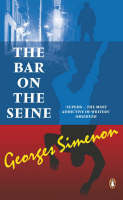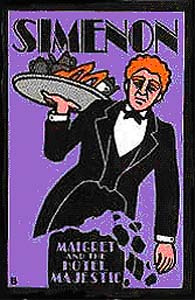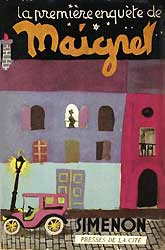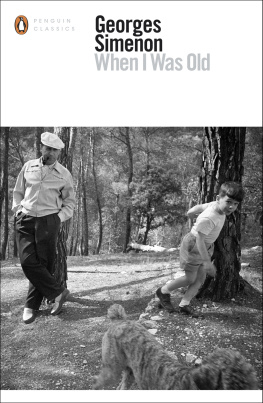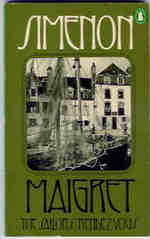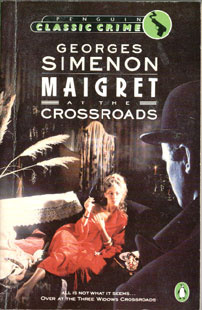Georges Simenon - Chez Krull
Here you can read online Georges Simenon - Chez Krull full text of the book (entire story) in english for free. Download pdf and epub, get meaning, cover and reviews about this ebook. year: 1966, publisher: Four Square, genre: Detective and thriller. Description of the work, (preface) as well as reviews are available. Best literature library LitArk.com created for fans of good reading and offers a wide selection of genres:
Romance novel
Science fiction
Adventure
Detective
Science
History
Home and family
Prose
Art
Politics
Computer
Non-fiction
Religion
Business
Children
Humor
Choose a favorite category and find really read worthwhile books. Enjoy immersion in the world of imagination, feel the emotions of the characters or learn something new for yourself, make an fascinating discovery.

- Book:Chez Krull
- Author:
- Publisher:Four Square
- Genre:
- Year:1966
- Rating:3 / 5
- Favourites:Add to favourites
- Your mark:
- 60
- 1
- 2
- 3
- 4
- 5
Chez Krull: summary, description and annotation
We offer to read an annotation, description, summary or preface (depends on what the author of the book "Chez Krull" wrote himself). If you haven't found the necessary information about the book — write in the comments, we will try to find it.
Chez Krull — read online for free the complete book (whole text) full work
Below is the text of the book, divided by pages. System saving the place of the last page read, allows you to conveniently read the book "Chez Krull" online for free, without having to search again every time where you left off. Put a bookmark, and you can go to the page where you finished reading at any time.
Font size:
Interval:
Bookmark:

CHEZ KRULL
Georges Simenon
was first published in France in 1939 (under the same title) and in Great Britain in 1955
Translated from the French by Daphne Woodward
Table Of Contents
CHEZ KRULL
CHAPTER ONE
The thing about the Krull house, the Krull family, which struck Hans who was a Krull too, but a genuine one, a Krull from Germany first of all, even before he was out of the taxi, was an advertisement on transparent paper stuck on the glass door of the shop.
Curiously enough, with so many details vying for his attention, he had eyes only for this advertisement, with its two words which he deciphered backwards: Amidon Rmy.
The background was blue, a rich ultramarine blue, and the centre was occupied by a white and placid lion.
Everything else, for the moment, existed only in relation to this lion, with his spotless mane, white as a sheet: another advertisement, also transparent, bearing the words Bleu Reckitt, but for some obscure reason, playing only a subordinate role; a single word painted in yellow, half its letters on the left-hand pane of the door and the other half on the right: Buvette-, a window full of ropes, lamps, whips and pieces of harness; further off, in the sunshine, there was a canal, trees, motionless barges, and all along the quay a yellow tram ran, its bell jangling.
'Amidon Rmy!' Hans spelled out as he emerged from the taxi.
The words sounded like an incantation, more specially as he knew little French and did not understand what they meant.
Looking up and putting his change into his pocket, he thought to himself:
'Now we'll see what the French Krulls are like!'
Above the shop a window was open, and there could be seen the upper half of a young man in shirt-sleeves, sitting at a table covered with exercise-books. From somewhere else in the house rang out the sound of vigorous piano-playing.
Suddenly Hans noticed, behind the shop window with its ship-chandler's goods, in a dim light which gave an impression of distance, a woman's forehead, grey hair, a pair of eyes. At the same moment the shirt-sleeved young man came to the first-floor window and looked with curiosity at the taxi; another window, to the right, which opened, the sharp-featured face of a young girl....
There were only three yards of pavement to cross, a glass-panelled door to push open. In his left hand Hans carried a suitcase of yellow leather, or, to be precise, of imitation leather, but very well imitated, as they know how to do it in Germany. Being tall, he took long strides. One stride. Two strides. He put out his hand to the door-knob and it opened of its own accord while an extraordinary voice, a woman's voice, but hoarse with a discordant mixture of deep and shrill notes, screeched, drowning all other sounds:
'Of course you're a wicked woman, and well you know it.... You're a wicked lot in this house.... Thieves, dirty little thieves, and wicked into the bargain....'
Hans had to stand by, holding his suitcase, while two women jostled together in the doorway, one shaking the other and trying to push her out, the shrew obstinately determined to have her say.
One word struck Hans, the word 'wicked': he thought he knew what it meant, but he did not see how it could apply to a family like the Krulls. And then something said by the grey-haired shopwoman, who must be his aunt:
'Get along, Pipi, don't start a row!'
And 'Pipi' took her place in a pigeon-hole in his memory, where Rmy Starch was already stored.
All this had taken no longer than was needed to get out of the taxi, pay the driver and cross the pavement. Already the young man from the first floor was emerging from the shop, grabbing the drunken woman's arm and pushing her, hard enough to send her tottering several yards away.
'Hans Krull?' he asked, taking the new arrival's suitcase.
'That's right,' replied Hans in German.
After all, it would take a little time to get used to things: his aunt was looking him up and down, down and up, but it was clear that what impressed her most was the suitcase with its gleaming nickel fastenings.
'Come in, cousin,' the young man was saying, as he cast a final threatening glance at the woman they had called Pipi.
Then the smell began. Not at once: the first thing was the bell. As the door opened and shut a bell rang, with a sound one seemed never to have heard anywhere else.
Then, inside the shop, came the smell, a mixture of Norwegian tar, which is used to coat barges, of ropes and of spices, topped off by the spirits which were served at one zinc-covered end of the counter.
'Come into the parlour, cousin.... We didn't think you'd take a taxi.... Anna! ... Elisabeth! ... Cousin Hans is here! ...'
Behind the shop Hans glimpsed a kitchen which he felt sure must be the centre of life in the house, but he was steered to the right, across a cold, blue-tiled corridor, into a parlour where a girl jumped up hastily from the revolving stool in front of the piano.
'How do you do....'
'How do you do....'
'This is ElisabethLiesbeth, as Father calls her.... Here is Anna.... I'm Joseph....'
'Don't you speak any French at all?' asked Elisabeth, while her mother, hands folded on her stomach, remained stock-still in the doorway.
'Very little.... Very badly.... You'll have to teach me...'
Introductions are always disagreeable and yet Hans kept his good humour, a special type of good humour unknown in this house. It was more a kind of physical and moral lightness. He moved easily and his movements were graceful like a dancer's, while his eyes, which were small, sparkled with enjoyment and perhaps with mischief.
'You would like me to show you to your room?' recited Joseph, who was about the same age, twenty-five, but moved all of a piece, with deliberation.
The stairs were polished and creaked. The whole house smelt like the shop, only not so strong, with, upstairs, a musty closeness. The landing window looked onto a courtyard, a garden with just one tree in it.
'This way.... The room is in the attic, but there's a view of the canal.... Would you like a wash?'
Hans glanced at his hands, which were perfectly clean. He smiled, was on the point of explaining why. Ought he to tell?
Not right away! he decided. Later, he would perhaps explain how in the train coming from Cologne he had made the acquaintance of a pretty woman, had helped her to smuggle some things through the Customs, and, on arriving at the station, had taken her to the Railway Hotel.
It was the sort of adventure that was always happening to him, almost unintentionally. She hadn't even undressed. She had said:
'My sister-in-law's expecting me at half-past four, and my husband gets home at six...
That was why he had tidied up before coming to the Krulls' house. He hadn't even asked her name. She had got into a yellow tram.
'You've seen almost all the family now,' Joseph was explaining conscientiously while his cousin opened his suitcase and took out a few small things. 'Mama looks after the shop...'
'Why did she call that woman Pipi? Is it a name?'
'A nickname! That woman is mother's nightmare. She lives with her daughter and a tramp in a derelict barge on the canal, partly under water. She does shopping for the bargemen, especially those who pass through and stop only a few minutes in the lock. She's drunk from morning to night, and when she feels like it she'll squat just anywhere, beside the water, on the pavement, to relieve herself....'
'I see.'
'My sister Anna, the eldest....'
'How old?'
'Thirty! She runs the house. When you got here she was ironing in the kitchen.... Elisabeth is seventeen.... She's studying the piano.... She wants to be a teacher....'
Next pageFont size:
Interval:
Bookmark:
Similar books «Chez Krull»
Look at similar books to Chez Krull. We have selected literature similar in name and meaning in the hope of providing readers with more options to find new, interesting, not yet read works.
Discussion, reviews of the book Chez Krull and just readers' own opinions. Leave your comments, write what you think about the work, its meaning or the main characters. Specify what exactly you liked and what you didn't like, and why you think so.


